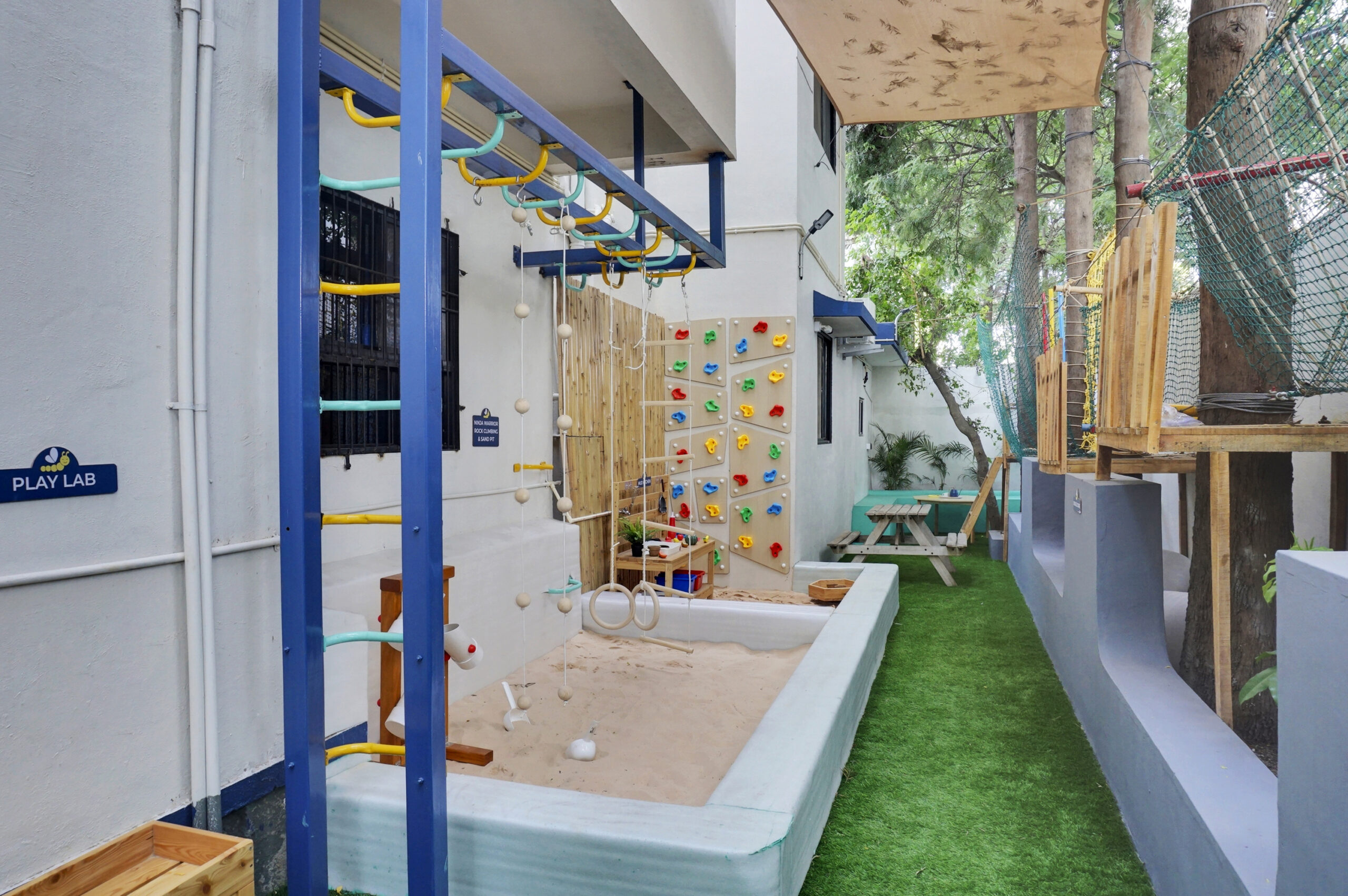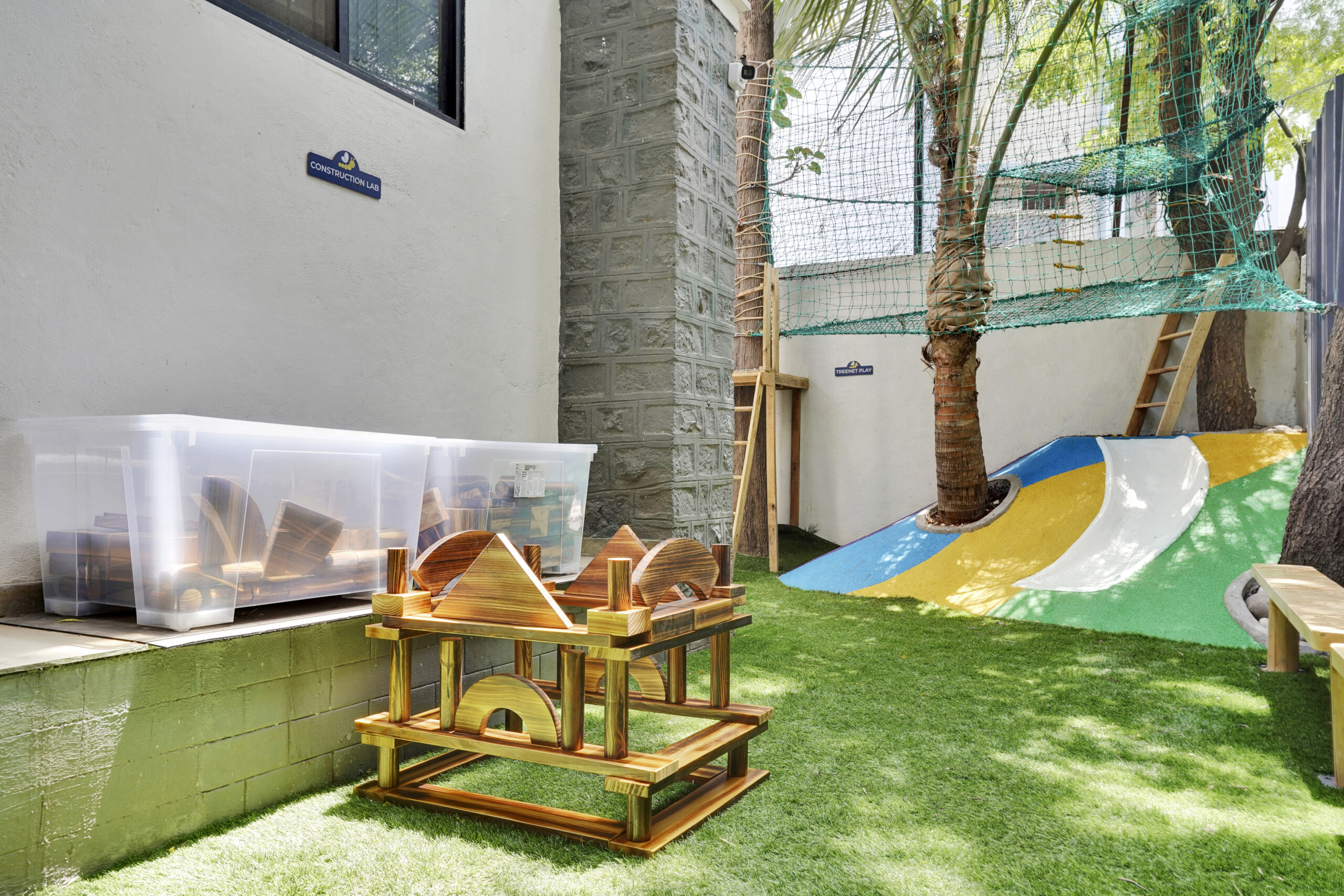KAIZEN LEARNING LABS
Hands-On Exploration & Creativity
Unique Learning Labs at Kaizen Early Years

Play Lab: A Montessori-Inspired Space for Building Motor Skills
Play Lab is a thoughtfully designed environment that integrates Montessori principles with the progressive philosophy of Shuhari—a Japanese concept representing the stages of learning: Shu (Learn), Ha (Adapt), and Ri (Innovate). This space is dedicated to nurturing children’s motor skills through purposeful play, fostering holistic development and a lifelong love for learning.
🧠 Shu (Learn): Foundational Skill Development
In the initial stage, children engage in structured activities that lay the groundwork for motor skill development:
Practical Life Exercises: Tasks like pouring, spooning, buttoning, and zipping enhance fine motor coordination and independence.
Sensorial Activities: Materials such as texture boards and color tablets refine sensory perception and hand-eye coordination.
Gross Motor Exploration: Activities like walking on balance beams and climbing promote balance and spatial awareness.
🔄 Ha (Adapt): Encouraging Flexibility and Creativity
As children progress, Play Lab offers opportunities to adapt and personalize their learning experiences:
Choice-Driven Exploration: Children select activities that resonate with their interests, fostering autonomy and intrinsic motivation.
Collaborative Play: Mixed-age groupings encourage peer learning, mentorship, and social skill development.
Imaginative Scenarios: Open-ended materials support creative expression and problem-solving abilities.
💡 Ri (Innovate): Fostering Independent Thought and Innovation
In the final stage, Play Lab empowers children to innovate and apply their skills creatively:
Project-Based Learning: Children undertake self-initiated projects, integrating motor skills with critical thinking and creativity.
Reflective Practices: Opportunities for children to assess their work and process encourage metacognition and continuous improvement.
Integration of Technology: Introducing age-appropriate tools like simple coding kits bridges traditional Montessori methods with modern innovation.
🌟 Holistic Development and Lifelong Learning
Play Lab’s environment is meticulously prepared to support the physical, cognitive, emotional, and social growth of each child:
Individualized Learning Paths: Recognizing that each child learns differently, activities are tailored to meet diverse needs and paces.
Emphasis on Independence: Children are encouraged to take ownership of their learning, building confidence and self-efficacy.
Community Engagement: Regular interactions with peers and facilitators cultivate a sense of belonging and collaborative spirit.
Play Lab stands as a beacon of innovative early childhood education, seamlessly blending Montessori methodologies with the dynamic progression of Shuhari. It offers a nurturing space where children not only develop essential motor skills but also embark on a journey of self-discovery, adaptability, and innovation.

Make Lab: Hands-on Construction and Craft Activities
Inspired by Monozukuri – The Art of Making with Heart and Precision
Make Lab is a dynamic, hands-on learning environment where children explore construction, crafting, and design through purposeful play. Rooted in the Japanese philosophy of Monozukuri—which translates to “making things” with skill, spirit, and dedication—this space encourages young minds to engage in the joy of creation, fostering both technical skills and a deep appreciation for craftsmanship.
🔧 What is Monozukuri?
Monozukuri is more than just manufacturing; it embodies a mindset of continuous improvement, meticulous attention to detail, and pride in one’s work. It emphasizes the harmony between the maker and the materials, encouraging a heartfelt connection to the process of creation. This philosophy has been integral to Japan’s rich history of craftsmanship and innovation, from traditional arts to modern engineering.
🌟 Educational Benefits
Enhances Fine and Gross Motor Skills: Manipulating tools and materials strengthens coordination and dexterity.
Promotes Problem-Solving and Critical Thinking: Designing and building require planning, testing, and iterative improvements.
Fosters Creativity and Innovation: Open-ended projects encourage imaginative thinking and unique solutions.
Builds Confidence and Independence: Completing tangible projects instills a sense of accomplishment and self-reliance.
Cultivates Appreciation for Craftsmanship: Understanding the effort and skill involved in making things nurtures respect for artisanship and quality.
🧠 Integrating Philosophy with Practice
By embracing the principles of Monozukuri, Make Lab not only teaches children how to make things but also instills values of perseverance, mindfulness, and pride in one’s work. This holistic approach ensures that learners develop both practical skills and a thoughtful, reflective mindset towards creation.
Make Lab stands as a testament to the belief that making is a profound human endeavor. Through engaging, hands-on experiences, it nurtures the next generation of thoughtful creators, innovators, and artisans.

Grow Lab: Gardening and Nature Exploration
Inspired by Satoyama – Coexistence with Nature
Grow Lab is an immersive educational environment where children engage in hands-on gardening and nature-based activities. Drawing inspiration from the Japanese concept of Satoyama, which embodies the harmonious coexistence between humans and nature, Grow Lab fosters a deep connection to the environment through experiential learning.
🌱 Understanding Satoyama
Satoyama refers to the traditional rural landscapes of Japan, characterized by a mosaic of forests, rice paddies, grasslands, and human settlements. These areas exemplify a sustainable relationship between people and nature, where communities have long managed the land to support biodiversity and ecological balance.
🌼 Grow Lab in Action
At Grow Lab, children participate in activities that mirror the principles of Satoyama:
Organic Gardening: Students cultivate vegetables, herbs, and flowers, learning about plant life cycles, soil health, and sustainable farming practices.
Composting and Recycling: Through composting organic waste, children understand the importance of nutrient cycles and waste reduction.
Habitat Creation: Building birdhouses, insect hotels, and planting native species to support local wildlife and promote biodiversity.
Seasonal Observations: Encouraging mindfulness and awareness by tracking seasonal changes, weather patterns, and phenological events.
🌟 Educational Benefits
Academic Enhancement: Integrates science, math, and environmental studies through practical applications.
Physical Development: Activities like digging, planting, and harvesting improve motor skills and physical health.
Emotional Well-being: Interaction with nature has been linked to reduced stress and increased emotional resilience.
Social Skills: Collaborative projects foster teamwork, communication, and a sense of community.
Environmental Stewardship: Instills a lifelong respect for nature and an understanding of sustainable practices.
🧠 Integrating Philosophy with Practice
By embracing the principles of Satoyama, Grow Lab not only teaches children about gardening but also instills values of harmony, sustainability, and respect for the natural world. This holistic approach ensures that learners develop both practical skills and a thoughtful, reflective mindset towards the environment.
Grow Lab stands as a testament to the belief that nurturing a connection with nature is essential for personal growth and ecological responsibility. Through engaging, hands-on experiences, it cultivates the next generation of environmentally conscious individuals.

Discover Lab: Inspired by Kagaku – The Pursuit of Knowledge through Science
Discover Lab is an engaging, hands-on learning environment where children delve into the wonders of science through interactive experiments and explorations. Rooted in the Japanese concept of Kagaku (科学), which embodies the systematic pursuit of knowledge, Discover Lab fosters a spirit of inquiry, critical thinking, and a lifelong passion for discovery.
🧠 Understanding Kagaku
In Japanese, Kagaku (科学) translates to “science,” encompassing various disciplines such as physics, chemistry, biology, and more. It signifies a structured approach to understanding the natural world through observation, experimentation, and analysis. This concept emphasizes the importance of curiosity and the continuous quest for knowledge.
🌟 Educational Benefits
• Enhances Critical Thinking: Children learn to ask questions, analyze results, and draw conclusions, fostering problem-solving abilities.
• Stimulates Curiosity: Hands-on activities ignite a desire to explore and understand various phenomena.
• Builds Confidence: Successfully conducting experiments boosts self-esteem and encourages independent learning.
• Promotes Collaboration: Group experiments teach teamwork and communication skills.
• Integrates Multiple Disciplines: Science activities often incorporate math, reading, and writing, providing a holistic educational experience.
🧠 Integrating Philosophy with Practice
By embracing the principles of Kagaku, Discover Lab not only teaches scientific concepts but also instills a mindset of inquiry and exploration. This approach encourages children to view the world through a scientific lens, fostering a deeper understanding and appreciation of their surroundings.
Discover Lab stands as a testament to the belief that science is not just a subject but a way of thinking. Through engaging, hands-on experiences, it cultivates the next generation of inquisitive minds, ready to explore, question, and innovate.






